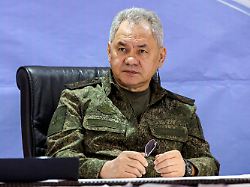Don’t blame anyone
Schoigu speaks for the first time about the Wagner revolt
7/3/2023 2:04 p.m
According to their boss, Yevgeny Prigozhin, the trigger for the uprising of the Wagner mercenaries was military misconduct on the part of Defense Minister Shoigu. Around ten days after the end of the revolt, the 68-year-old spoke of an attempt at destabilization without naming names.
In his first statement after the unsuccessful revolt of the Wagner mercenaries, Russia’s Defense Minister Sergei Shoigu praised the loyalty and operational readiness of the regular troops. “The provocation had no impact on the actions of the armed forces grouping (in Ukraine),” Shoigu said at a meeting at the ministry. The soldiers at the front continued to do their jobs. “Overall, the enemy did not reach their target in any direction of attack,” he said.
In his speech, Shoigu named neither the mercenary leader Yevgeny Prigozhin nor the Wagner troops under his command as responsible for the uprising. Instead, he spoke of an attempt to destabilize the situation in Russia. “These plans failed mainly because the members of the armed forces stayed true to their oath and their duty,” said the 68-year-old.
About ten days ago, Prigozhin had Wagner, his private army fighting on Moscow’s side in the Ukraine war, occupy the southern Russian city of Rostov-on-Don and sent a military column towards Moscow. He justified this with an attack by Russian troops allegedly ordered by Shoigu on a Wagner military camp.
Lukashenko brokered a peaceful solution
Despite isolated attempts to stop the procession, the mercenaries were able to travel hundreds of kilometers practically unhindered before Prigozhin himself gave the order to retreat. Apparently, there had previously been negotiations mediated by the Belarusian ruler Alexander Lukashenko. The Kremlin therefore granted the insurgents amnesty and the possibility of leaving for Belarus.
Prigozhin made serious allegations against both Shoigu and Deputy Chief of Staff Valery Gerasimov, citing their alleged military misconduct as the reason why he wanted his fighters to march on Moscow. After the end of the uprising, speculation increased as to whether there might be personnel changes in the Russian military leadership.
Gerasimov has not appeared in public since the uprising. The Kremlin has not commented on the whereabouts of the Russian deputy chief of staff. It is a matter for the Defense Ministry, said Kremlin spokesman Dmitry Peskov.
